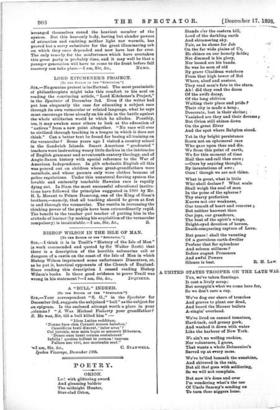LORD KITCHENER'S PROJECT.
[TO THE EDITOR OF THE "SPECTATOR."] SIR,—No genuine protest is ineffectual. The most pessimistic of philanthropists might take this comfort to his soul on reading the convincing article, " Lord Kitchener's Project," in the Spectator of December 3rd. Even if the writer had put less eloquently the case for educating a subject race through its own vernacular or related language, what be says must encourage those already on his side in the battle against the whole utilitarian world to which he alludes. Possibly, too, it may awaken some others to look at the education of " natives" from a new point altogether. "No race will ever be civilified through teaching in a tongue in which it does not think." Can a better text be found for basing all training on the vernacular ? Some years ago I visited a country school in the Sandwich Islands. Smart American " graduated " teachers were instructing weary little darkies in the intricacies of English grammar and seventeenth-century theology, and of Anglo•Saxon history with special reference to the War of American Independence. In glib scholastic English all this was poured out on children whose great-grandfathers were cannibals, and whose parents only wore clothes because of police regulations. Under this unnatural forcing system the lovable and eminently teachable Hawaian race is rapidly dying out. In Siam the most successful educational institu- tions have followed the principles suggested in 1890 by Mr. R. L. Morant to Prince Damrong, one of the King of Siam's brothers,—namely, that all teaching should be given at first in and through the vernacular. The results in increasing the thinking power of the pupils have been extraordinarily rapid. The benefit to the teacher gad, teacher of putting him in the attitude of learner (by making his acquisition of the vernacular
compulsory) is incalculable.—I am, Sir, &c., S.










































 Previous page
Previous page